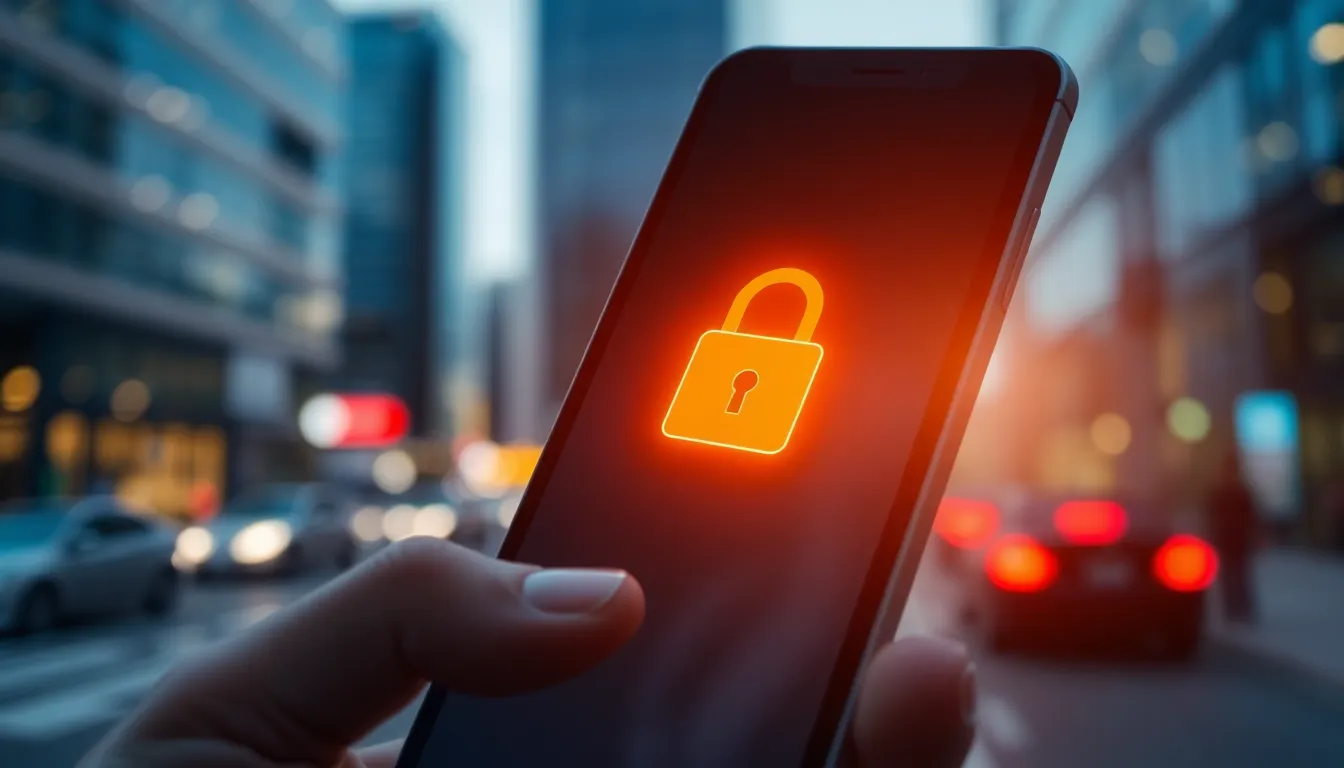In an age where digital communication dominates, the security of personal messages has never been more crucial. Phone message encryption serves as a vital shield, protecting sensitive information from prying eyes. As cyber threats continue to evolve, understanding how encryption works can empower users to safeguard their conversations effectively.
This technology transforms readable messages into coded text, making it nearly impossible for unauthorized parties to decipher. Whether it’s a private chat or a business discussion, encryption ensures that only intended recipients can access the content. With the increasing reliance on smartphones for communication, grasping the importance of phone message encryption is essential for anyone looking to maintain their privacy in a connected world.
Table of Contents
ToggleOverview of Phone Message Encryption
Phone message encryption secures communication by converting legible messages into coded text. This transformation ensures that only intended recipients can decode and access the message’s content. Encryption operates through algorithms that govern how data is scrambled and unscrambled, providing a significant layer of security against unauthorized access.
Types of Encryption Methods
- End-to-End Encryption: This method encrypts messages on the sender’s device and only decrypts them on the recipient’s device. Examples include apps like Signal and WhatsApp, where even the service provider cannot access the message content.
- Transport Layer Security (TLS): TLS secures data during transmission by creating a secure connection between devices. This method encrypts messages as they travel through the network, preventing interception.
- Public Key Infrastructure (PKI): PKI uses a pair of cryptographic keys—public and private keys. The sender encrypts the message with the recipient’s public key, and only the recipient can decrypt it with their private key, ensuring confidentiality.
Benefits of Phone Message Encryption
- Enhanced Privacy: Encryption protects sensitive information, such as personal data or financial details, from cybercriminals.
- Integrity Assurance: Encryption ensures that messages are not altered during transmission. Recipients can trust the content’s authenticity.
- Regulatory Compliance: Many businesses must comply with data protection regulations like GDPR or HIPAA, which mandate encryption of sensitive communications.
Common Applications of Encryption
- Messaging Apps: Numerous applications, such as Telegram and Viber, utilize encryption to secure user communications, thus promoting user trust.
- Email Services: Providers like ProtonMail focus on encrypted email services, safeguarding user correspondence from unauthorized access.
- File Sharing: Encryption plays a crucial role in secure file-sharing platforms, ensuring only authorized users access shared files.
Understanding phone message encryption significantly enhances users’ security and privacy in digital communications.
Importance of Phone Message Encryption

Phone message encryption plays a critical role in safeguarding digital communication by protecting personal messages from unauthorized access. As users send sensitive information, encryption ensures that only intended recipients can comprehend the content.
Privacy Concerns
Privacy remains a primary concern in communication. Without encryption, personal messages become vulnerable to interception by unauthorized individuals, including hackers and government entities. Encryption protects sensitive data like personal conversations, financial information, and health records, maintaining users’ privacy during communication. Studies indicate that 69% of users express concern about their privacy when using messaging apps, underscoring the necessity for effective encryption solutions.
Data Security
Data security is paramount in today’s interconnected world. Encryption adds a crucial layer of security by converting readable messages into coded text, making unauthorized access difficult. Effective encryption methods like End-to-End Encryption ensure that data remains secure during transmission, reducing the risk of leaks or breaches. According to the Cybersecurity and Infrastructure Security Agency (CISA), utilizing encryption can significantly mitigate the potential impact of data breaches, leading to enhanced trust in digital messaging platforms.
How Phone Message Encryption Works
Phone message encryption secures communication by converting readable text into coded messages. It ensures that only intended recipients possess the ability to decode the content.
End-to-End Encryption
End-to-End Encryption (E2EE) prevents unauthorized access to messages by ensuring they remain secure from the sender’s device to the receiver’s device. Only the devices involved in the communication hold the encryption keys, making it impossible for intermediaries, including service providers, to decrypt the messages. Apps employing E2EE, such as Signal and WhatsApp, utilize this method effectively, offering users peace of mind regarding their conversations. With E2EE, even if hackers intercept the messages, they cannot decipher the content without the encryption keys.
Types of Encryption Algorithms
Various encryption algorithms strengthen phone message encryption, each offering distinct advantages. Common types include:
- Symmetric Encryption: Utilizes a single key for both encryption and decryption, facilitating quick processing. Examples include Advanced Encryption Standard (AES) and Data Encryption Standard (DES).
- Asymmetric Encryption: Employs a pair of keys—public and private keys. The public key encrypts the message, while the private key decrypts it. This method enhances security in data exchange. RSA (Rivest-Shamir-Adleman) is a widely used asymmetric algorithm.
- Hashing Algorithms: Converts input data into a fixed-size string of characters, providing a unique output for each distinct input. Hashing is common in digital signatures and password security. SHA-256 (Secure Hash Algorithm 256-bit) is a well-known example.
Understanding these encryption types helps users recognize the measures in place protecting their messages from potential breaches and unauthorized access.
Popular Phone Message Encryption Applications
Several applications implement robust encryption methods, ensuring secure communication for their users. These applications offer various features that enhance privacy through encryption.
Signal
Signal provides end-to-end encryption for text messages, voice calls, and video calls. Developed by the Signal Foundation, this app prioritizes user privacy by using the Signal Protocol, which safeguards all forms of communication within the app. Signal’s open-source nature allows independent audits, ensuring transparency in security practices. Users can send encrypted messages, create self-destructing messages, and utilize disappearing media features, reinforcing message confidentiality.
WhatsApp features end-to-end encryption, ensuring that only the sender and recipient can access message content. Utilizing the Signal Protocol, WhatsApp encrypts messages, calls, photos, and videos. This platform automatically applies encryption, making secure communication seamless. Users can enable two-step verification and manage privacy settings to enhance their account security. By January 2021, WhatsApp had reported over 487.5 million active users, highlighting the demand for secure messaging options.
Telegram
Telegram offers a unique approach to encryption with optional end-to-end encryption via its “Secret Chats” feature. Unlike standard chats, which use server-client encryption, Secret Chats employ the MTProto protocol for enhanced security. Users benefit from features like auto-delete, disappearing messages, and unlimited file sharing. Telegram’s focus on privacy has attracted over 700 million monthly active users as of October 2023, making it a popular choice among users concerned with privacy and security.
Phone message encryption is essential for safeguarding personal communication in an increasingly digital world. By utilizing various encryption methods like End-to-End Encryption and Transport Layer Security, users can ensure their messages remain confidential and secure from prying eyes.
As privacy concerns continue to rise, understanding the importance of encryption helps individuals make informed choices about their communication tools. With robust applications like Signal and WhatsApp leading the way in implementing effective encryption strategies, users can enjoy peace of mind knowing their messages are protected.
Investing in knowledge about phone message encryption not only enhances personal security but also fosters trust in digital interactions.






